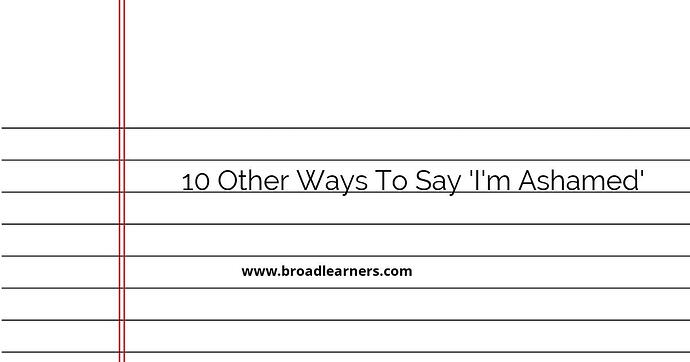Feeling ashamed is a common emotion that everyone experiences at some point in their lives. However, expressing this feeling can be challenging, especially when you're looking for alternative ways to say 'I'm ashamed.'
In this article, we will explore 10 other phrases you can use to express your shame or regret:
- I feel remorseful
- I'm filled with regret
- I'm deeply sorry
- I'm embarrassed
- I'm mortified
- I feel guilty
- I'm regretful
- I'm sorry for my actions
- I'm disappointed in myself
- I'm ashamed of my behavior
Let's delve into each alternative phrase and see how they can be used in different contexts:
1. I Feel Remorseful
'I feel remorseful' is a more formal way to express your shame. It indicates a deep sense of regret and sorrow for your actions or behavior.
Example:
I feel remorseful for the way I spoke to you. It was completely uncalled for, and I deeply regret my words.
2. I'm Filled with Regret
This phrase conveys a strong sense of sadness and disappointment in oneself. It implies that you wish you could change your actions or decisions.
Example:
I'm filled with regret for not attending the important meeting. I missed out on valuable information, and I apologize for my absence.
3. I'm Deeply Sorry
'I'm deeply sorry' is a sincere and heartfelt way to express your shame or regret. It shows genuine remorse and a desire to make amends.
Example:
I'm deeply sorry for my behavior last night. I acted out of line and hurt your feelings, and I want to make it right.
4. I'm Embarrassed
'I'm embarrassed' is a more casual way to express shame. It indicates that you feel self-conscious or humiliated by your actions or situation.
Example:
I'm embarrassed by my mistake in front of the entire team. I should have double-checked the numbers before presenting.
5. I'm Mortified
'I'm mortified' suggests extreme shame or embarrassment. It conveys a feeling of being horrified or deeply ashamed by something you've done.
Example:
I'm mortified by my behavior at the party last night. I made a fool of myself, and I can't believe I acted that way.
6. I Feel Guilty
'I feel guilty' expresses a sense of remorse and responsibility for your actions or choices. It implies that you understand the negative consequences of your behavior.
Example:
I feel guilty for not keeping my promise to help you. I know I let you down, and I'm truly sorry.
7. I'm Regretful
'I'm regretful' is similar to feeling remorseful. It implies a deep sense of regret and a wish to change or undo what has been done.
Example:
I'm regretful for not realizing the impact of my words sooner. I understand now how hurtful they were, and I apologize.
8. I'm Sorry for My Actions
This phrase explicitly states that you are apologizing for your actions. It shows ownership and acknowledges the negative consequences they may have caused.
Example:
I'm sorry for my actions during the argument. I should have controlled my temper, and I'm truly sorry for the hurtful things I said.
9. I'm Disappointed in Myself
'I'm disappointed in myself' conveys a sense of personal letdown and regret. It implies that you expected better from yourself and feel ashamed of not meeting those expectations.
Example:
I'm disappointed in myself for not meeting the deadline. I let down the team, and I take full responsibility for my actions.
10. I'm Ashamed of My Behavior
'I'm ashamed of my behavior' is a direct way to express your shame. It indicates that you feel deeply embarrassed or remorseful for your actions or conduct.
Example:
I'm ashamed of my behavior at the party. I acted recklessly and caused a scene, and I apologize for my actions.
These alternative phrases provide you with various options to express your shame or regret in different situations. Remember to choose the phrase that best fits the context and your level of remorse. Apologizing and taking responsibility for your actions is an important step towards personal growth and maintaining healthy relationships.
Did I miss anything? Respond below
